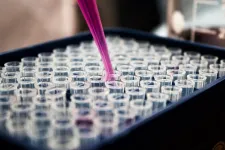(Press-News.org) A University of Birmingham-led study funded by the UK Coronavirus Immunology Consortium has found that many patients with COVID-19 produce immune responses against their body's own tissues or organs.
COVID-19 has been associated with a variety of unexpected symptoms, both at the time of infection and for many months afterwards. It is not fully understand what causes these symptoms, but one of the possibilities is that COVID-19 is triggering an autoimmune process where the immune system is misdirected to attack itself.
The study, published today (June 4) in the journal Clinical & Experimental Immunology, investigated the frequency and types of common autoantibodies produced in 84 individuals who either had severe COVID-19 at the time of testing or in the recovery period following both severe COVID-19 and those with milder disease that did not need to attend hospital. These results were compared to a control group of 32 patients who were in intensive care for another reason other than COVID-19.
An autoantibody is an antibody (a type of protein) produced by the immune system that is directed against one or more of the individual's own proteins and can cause autoimmune diseases. Infection can, in some circumstances, lead to autoimmune disease. Early data suggest that SARS-CoV-2 infection can trigger long-term autoimmune complications and there are reports of SARS-CoV-2 infection being associated with a number of autoimmune disorders including Guillain-Barre Syndrome.
Supported by UK Research and Innovation (UKRI) and the National Institute for Health Research (NIHR), the study found higher numbers of autoantibodies in the COVID-19 patients than the control group and that these antibodies lasted up to six months.
Non-COVID patients displayed a diverse pattern of autoantibodies; in contrast, the COVID-19 groups had a more restricted panel of autoantibodies including skin, skeletal muscle and cardiac antibodies.
The authors also find that those with more severe COVID-19 were more likely to have an autoantibody in their blood.
First author Professor Alex Richter, of the University of Birmingham, explained: "The antibodies we identified are similar to those that cause a number of skin, muscle and heart autoimmune diseases.
"We don't yet know whether these autoantibodies are definitely causing symptoms in patients and whether this is a common phenomenon after lots of infections or just following COVID-19. These questions will be addressed in the next part of our study."
Senior Author Professor David Wraith, of the University of Birmingham, adds: "In this detailed study of a range of different tissues, we showed for the first time that COVID-19 infection is linked to production of selective autoantibodies. More work is needed to define whether these antibodies contribute to the long-term consequences of SARS-CoV-2 infection and hence could be targeted for treatment."
Professor Paul Moss, Principal Investigator of the UK Coronavirus Immunology Consortium and Professor of Haematology at the University of Birmingham added: "This is an interesting study that reveals new insights into a potential autoimmune component to the effects of COVID-19. Research like this has been made possible by the huge collaborative efforts made by those that are a part of the UK Coronavirus Immunology Consortium. This study is another important step towards delivering real improvements in prevention, diagnosis, and treatment of COVID-19 to patients."
The study participants were separated into four cohorts:
Group one: 32 individuals sampled during their stay in intensive care for reasons other than COVID-19. 41% of individuals had autoantibodies. In this group, there were many different causes of their illness (over half was pneumonia) and autoantibodies were found against nearly all of the different autoantigens examined, indicating a more random distribution.
Group two: 25 individuals who were sampled during their stay in intensive care following a diagnosis of severe COVID-19. 60% had autoantibodies. Of those who tested positive for autoantibodies, 41% had epidermal (skin) antibodies, while 17% had skeletal antibodies.
Group three: 35 individuals who had been admitted to intensive care with COVID-19, survived and were sampled three to six months later during routine outpatient follow up. 77% of individuals had autoantibodies. Of those who tested positive for autoantibodies, 19% had epidermal (skin) antibodies, 19% had skeletal antibodies, 28% had cardiac muscle antibodies; and 31% had smooth muscle antibodies.
Group four: 24 healthcare workers sampled one to three months after mild to moderate COVID-19 that did not require hospitalisation. 54% of individuals had autoantibodies. In those who tested positive for autoantibodies, it was against only four autoantigens: 25% had epidermal (skin) antibodies; 17% had smooth muscle antibodies; 8% had anti-neutrophil cytoplasm (ANCA) antibodies that target a type of human white blood cells; and 4% had gastric parietal antibodies which are associated with autoimmune gastritis and anaemia.
INFORMATION:
Notes to Editors
Richter et al (June, 2021). 'Establishing the prevalence of common tissue-specific autoantibodies following SARS CoV-2 infection.' Clinical & Experimental Immunology. DOI:10.1111/cei.13623
The University of Birmingham is ranked amongst the world's top 100 institutions, and its work brings people from across the world to Birmingham, including researchers and teachers and more than 6,500 international students from nearly 150 countries.
The UK Coronavirus Immunology Consortium brings together 20 UK immunology centres of excellence to research how the immune system interacts with SARS-CoV-2 to help us improve patient care and develop better diagnostics, treatments and vaccines against COVID-19. It is jointly funded by UK Research and Innovation (UKRI) and National Institute for Health Research (NIHR) and supported by the British Society for Immunology.
The National Institute for Health Research (NIHR) is the nation's largest funder of health and care research. The NIHR:
- Funds, supports and delivers high quality research that benefits the NHS, public health and social care
- Engages and involves patients, carers and the public in order to improve the reach, quality and impact of research
- Attracts, trains and supports the best researchers to tackle the complex health and care challenges of the future
- Invests in world-class infrastructure and a skilled delivery workforce to translate discoveries into improved treatments and services
- Partners with other public funders, charities and industry to maximise the value of research to patients and the economy
- The NIHR was established in 2006 to improve the health and wealth of the nation through research, and is funded by the Department of Health and Social Care. In addition to its national role, the NIHR supports applied health research for the direct and primary benefit of people in low- and middle-income countries, using UK aid from the UK government.
Under embargo until Thursday 3 June, 23:30 UK time / 18:30 US Eastern time
Peer-reviewed observational study in people
Prior Covid-19 infection reduces infection risk for up to 10 months
The risk of being infected with SARS-CoV-2, the virus that causes Covid-19, is substantially reduced for up to 10 months following a first infection, according to new findings from the Vivaldi study led by UCL researchers.
For the study, published in Lancet Healthy Longevity, researchers looked at rates of Covid-19 infections between October and February among more than 2,000 care home residents and staff, comparing those who had evidence of a previous infection up to 10 months earlier, as determined by antibody testing, with those who had ...
Levels of antibodies in the blood of vaccinated people that are able to recognise and fight the new SARS-CoV-2 Delta variant first discovered in India (B.1.617.2) are on average lower than those against previously circulating variants in the UK, according to new laboratory data from the Francis Crick Institute and the National Institute for Health Research (NIHR) UCLH Biomedical Research Centre, published today (Thursday) as a Research letter in The Lancet.
The results also show that levels of these antibodies are lower with increasing age and that levels decline over time, providing additional evidence in support of plans to deliver a vaccination boost to vulnerable people in the Autumn. ...
An immunotherapy drug given after surgery improved disease-free survival rates in patients with kidney cancer at high risk of relapse.
Interim results of a phase 3 trial of adjuvant therapy revealed a 32% decrease in the risk of recurrence or death with pembrolizumab compared with a placebo
This is the first positive study of immunotherapy in patients with kidney cancer at high risk of relapse.
BOSTON -- Treatment with an immunotherapy drug following kidney cancer surgery, prolonged disease-free survival rates in patients at high risk for recurrence, according to an interim ...
Sickle cell disease (SCD) is the most common deadly genetic disorder, affecting more than 300,000 newborns worldwide each year. It leads to chronic pain, organ failure, and early death in patients. A team led by researchers at the Broad Institute of MIT and Harvard and St. Jude Children's Research Hospital has now demonstrated a base editing approach that efficiently corrects the mutation underlying SCD in patient blood stem cells and in mice. This gene editing treatment rescued the disease symptoms in animal models, enabling the long-lasting production of healthy blood cells.
The root of SCD is two mutated copies of the hemoglobin gene, HBB, which cause red ...
After a 2020 Vanderbilt University Medical Center study showed women have a difficult time accessing treatment for opioid use disorder (OUD), investigators analyzed comments received from the study's participants to further shed light on barriers to care, which included everything from long on-hold times to difficult interactions with clinic receptionists during phone calls seeking appointments.
A "secret shopper" study published in JAMA Network Open in 2020 used trained actors trying to get into treatment for opioid use disorder in 10 U.S. states. More than 10,000 unique "patients" were randomly assigned to be pregnant or non-pregnant and have private or Medicaid-based insurance to assess differences ...
MEMPHIS, Tenn. - Cardiovascular imaging demonstrated no evidence of myocardial injury or myocarditis in athletes after COVID-19 infection, according to a research letter published in Circulation by Le Bonheur Children's Hospital and the University of Tennessee Health Science Center cardiologists. The screening and evaluation was conducted by the Le Bonheur Children's Heart Institute Sports Cardiology team, Benjamin S. Hendrickson, MD, Ranjit R. Philip, MD, and Ryan E. Stephens, NP-C, MBA, and Le Bonheur Director of Cardiac MRI Jason N. Johnson, MD, MHS. Researchers say this study confirms existing recommendations ...
The North American mockingbird is famous for its ability to imitate the song of other birds. But it doesn't just mimic its kindred species, it actually composes its own songs based on other birds' melodies. An interdisciplinary research team has now worked out how exactly the mockingbird constructs its imitations. The scientists determined that the birds follow similar musical rules as those found in human music, from Beethoven to Kendrick Lamar.
The song of the mockingbird is so complex that to investigate it required a joint effort of experts from very different fields. Neuroscientist Tina Roeske of the Max Planck Institute for Empirical Aesthetics, field biologist Dave Gammon of Elon University, ...
COVID-19 continues to claim lives across the world and is infecting millions more. Although several vaccines have recently become available, making significant strides towards preventing COVID-19, what about the treatment of those who already have the infection? Vaccines aren't 100% effective, highlighting the need--now more than ever--for effective antiviral therapeutics. Moreover, some people can't receive vaccines due to health issues, and new variants of SARS-CoV-2, the virus that causes COVID-19, that can penetrate vaccine-conferred immunity, are being reported, indicating that we need to think beyond prevention.
Given this need, a team of researchers based in Japan, the US, and the UK launched a project to develop effective therapeutics. ...
Stanford University computer science graduate student Mackenzie Leake has been quilting since age 10, but she never imagined the craft would be the focus of her doctoral dissertation. Included in that work is new prototype software that can facilitate pattern-making for a form of quilting called foundation paper piecing, which involves using a backing made of foundation paper to lay out and sew a quilted design.
Developing a foundation paper piece quilt pattern - which looks similar to a paint-by-numbers outline - is often non-intuitive. There are few formal guidelines for patterning and those that ...
Humans regularly exert a powerful influence on the survival and persistence of species, yet social-science information is used only sporadically in conservation decisions.
Researchers at Colorado State University and The Ohio State University have created an index depicting the mix of social values among people across all 50 states, providing data that can be useful for wildlife conservation policy and management.
As a specific illustration, the research team found a supportive social context for gray wolf reintroduction in Colorado. Last fall, citizens ...





